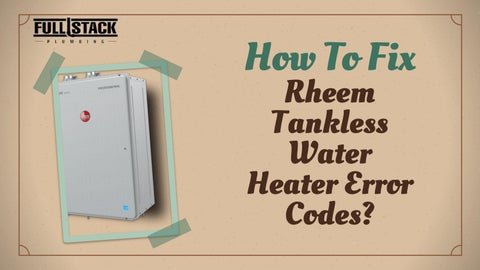
Rheem water heaters are designed to be reliable and efficient, giving you hot water whenever you need it. However, like any appliance, they can run into issues. The “Oe” error code is essentially a message from your water heater saying something’s not quite right. It’s kind of like your car’s check engine light. It’s there to alert you to a potential problem that might need fixing. While you might be tempted to ignore it and hope it goes away, understanding the root cause is crucial in preventing bigger problems down the line.
Understanding the Oe Error Code
When your Rheem water heater throws up an Oe error code, it signifies an issue with the water temperature sensor. This is a critical component that helps your water heater maintain the desired temperature. Think of it as the thermostat in your home; its job is to make sure the water is not too hot or too cold.
This error could mean a malfunctioning sensor that’s giving inaccurate readings or completely failing to communicate with the system. It’s similar to having a broken thermostat in winter—your heating system might not kick in when it’s supposed to, leaving you shivering in the cold. The Oe code might also indicate wiring issues or even a problem with the control board itself. Ignoring it could result in inconsistent water temperatures, or worse, a complete system shutdown.
So, what should you do if you see this code? The first step is not to panic. It’s a warning, not an emergency. Begin by consulting your water heater’s manual or Rheem’s customer support for guidance. Ensuring that your heater’s power source is secure and checking any visible wires for damage or disconnection can sometimes resolve the issue. However, for more complex problems, or if you’re uncomfortable troubleshooting, it might be best to call in a professional.
Can You Just Ignore It?
You might be tempted to ignore the Oe error code if the hot water is still flowing for now. After all, the shower works, so why worry? However, ignoring it could lead to more significant issues over time. It’s like having a small leak in a roof. While not immediately damaging, over time, it can cause extensive water damage that’s expensive to repair.
Ignoring the error code could lead to inefficient heating, resulting in higher energy bills. Your water heater might work harder than it should, leading to wear and tear on the system. Like driving your car with a flat tire, it’s only a matter of time before something gives. The error code is an invitation to perform timely maintenance, saving you from future headaches and costly repairs.
To prevent these issues, take proactive steps. Regular maintenance, such as flushing the tank to remove sediment buildup, checking the anode rod, and ensuring the temperature settings are correct, can help extend the life of your water heater. Regular check-ups by a licensed technician can catch problems early, maintaining your system’s efficiency.
Next Steps and Prevention
So, what should you do next? If you encounter the Oe error code, start by reading through the user manual specific to your Rheem model. Sometimes, a simple reset or a minor adjustment can fix the issue. If resetting doesn’t work, inspect the visible components and check for loose or damaged wires around the temperature sensor.
If the problem persists, it might be time to reach out to a professional. A qualified technician can diagnose the issue and provide a solution, ensuring your water heater returns to optimal operation. Regular maintenance is your best friend. Think of it like a doctor’s check-up for your appliance—a way to keep it in peak condition and avoid unexpected surprises.
In terms of prevention, consider scheduling annual maintenance checks. This proactive approach ensures any potential issues are caught early. Keep your water heater in a well-ventilated area and protect it from extreme temperatures to avoid unnecessary stress on the system. By treating the Oe code as an opportunity for maintenance rather than a problem, you’ll extend the life of your appliance and enjoy consistent hot water when you need it.